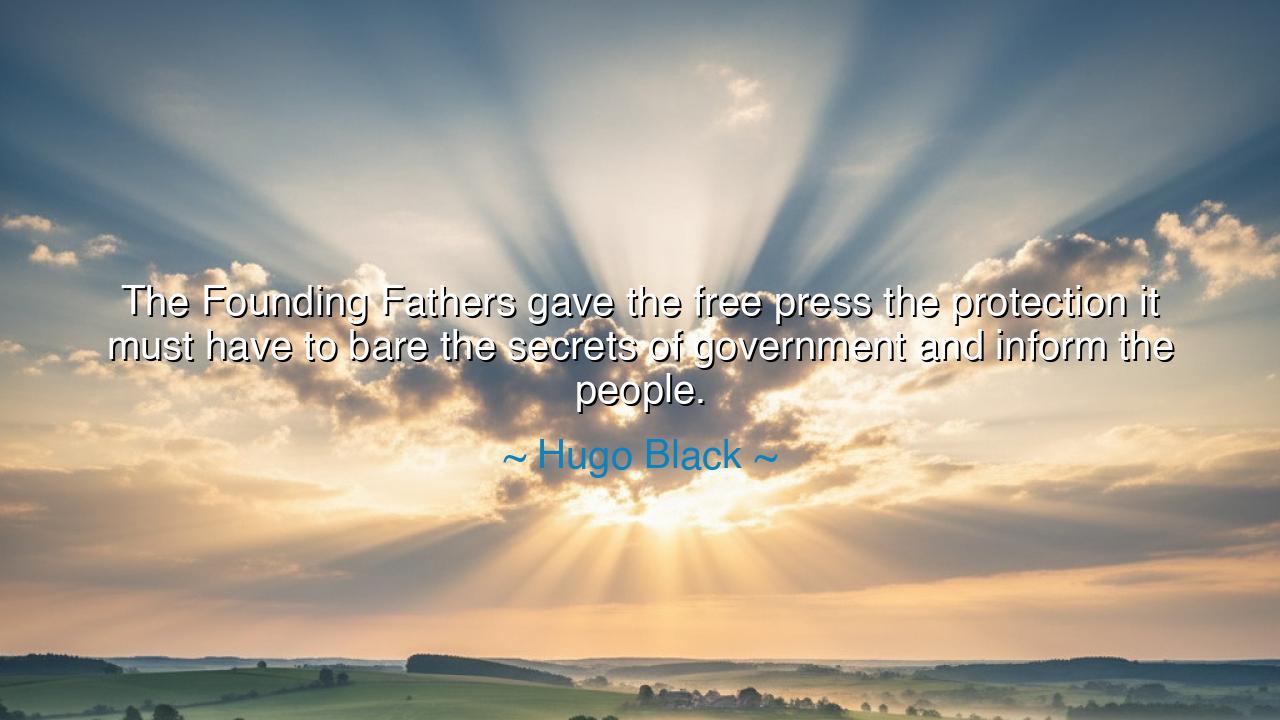
The Founding Fathers gave the free press the protection it must
The Founding Fathers gave the free press the protection it must have to bare the secrets of government and inform the people.






The words of Justice Hugo Black, carved in the marble of truth, stand as both a shield and a warning: “The Founding Fathers gave the free press the protection it must have to bare the secrets of government and inform the people.” In this declaration lies the beating heart of democracy—the sacred covenant between power and accountability, between rulers and the ruled. Black, one of the most ardent defenders of the First Amendment, reminds us that freedom is not preserved by silence or comfort, but by exposure, by the relentless light of truth. For it is only through an informed people that liberty survives; without knowledge, freedom rots into illusion.
The origin of this quote comes from Black’s concurring opinion in the historic New York Times Co. v. United States case of 1971, known forever as the Pentagon Papers decision. In that moment of crisis, the U.S. government sought to silence newspapers that were publishing classified documents revealing the hidden realities of the Vietnam War. The press had uncovered deception—proof that the people had been misled about the war’s progress and purpose. The government claimed “national security,” but Justice Black saw through this veil. To him, this was not security, but secrecy. He rose in defense of the Constitution, declaring that the press must be free to reveal the truth, even when it is inconvenient, even when it embarrasses those in power. For truth is the lifeblood of democracy, and those who fear it are unworthy to lead.
In the ancient style, let us see Black’s words as a torch passed down through the ages. The Founding Fathers, he reminds us, did not give the press freedom as a gift, but as a duty. They had lived under the tyranny of kings who censored speech, punished dissent, and ruled through darkness. Having torn themselves from that oppression, they understood that to keep a government honest, the people must be vigilant and informed. The free press, therefore, was not a luxury—it was a sword and shield against corruption. “To bare the secrets of government,” said Black, is not a crime but a service, for sunlight is the only cure for the disease of hidden power.
Consider the story of the Pentagon Papers themselves—a tale of courage and conscience. When the journalist Daniel Ellsberg released the documents to the press, he risked his freedom to reveal what leaders had concealed. Newspapers like The New York Times and The Washington Post faced the wrath of the state, accused of endangering the nation. Yet they stood firm. The Supreme Court, led by voices like Hugo Black’s, ruled that the government could not suppress the truth. “The press was to serve the governed, not the governors,” Black declared. And with those words, he reminded a weary nation that the right to know outweighs the comfort of ignorance.
The ancients would have called this the eternal struggle between power and truth. For all rulers are tempted to cloak their deeds in secrecy, and all free peoples must resist that temptation. A government that hides its actions from its citizens becomes, in time, their master. But a people who insist on knowing, questioning, and demanding transparency preserve the balance of liberty. This is what Black meant by “protection”—not for the press alone, but for the people themselves. The press is their messenger, their eyes and ears in the corridors of authority. To weaken it is to blind the nation.
Yet Black’s wisdom is not only a defense of institutions; it is a call to individual conscience. A free press cannot exist without free citizens who read, think, and discern. The right to information means little if the people grow indifferent or apathetic. Freedom of the press is not a shield for gossip or distraction—it is a sacred trust. To read the news, to question authority, to demand evidence—these are not idle acts, but the rituals of liberty. The Founders entrusted us, not the government, with the ultimate guardianship of truth. The question is not whether the press will be free, but whether the people will be worthy of that freedom.
So, my children of the future, remember the lesson of Justice Hugo Black: truth is the soul of freedom, and secrecy is its death. The press, though flawed and human, is the voice that speaks for the people when power would prefer silence. Defend it, even when it angers you. Support it, even when it exposes those you favor. For if the press loses its courage, the people lose their sight. And when the people are blind, tyranny walks unchallenged in daylight.
Let these words endure as both a command and a prayer: Power must be watched, truth must be told, and freedom must be taught. Every generation must keep alive the faith that knowledge is stronger than fear. In the balance between the state and the people, the free press stands as the fulcrum of liberty—ever bold, ever questioning, ever unbowed. As long as its ink flows and its voice endures, the promise of democracy will not perish from the earth.






AAdministratorAdministrator
Welcome, honored guests. Please leave a comment, we will respond soon